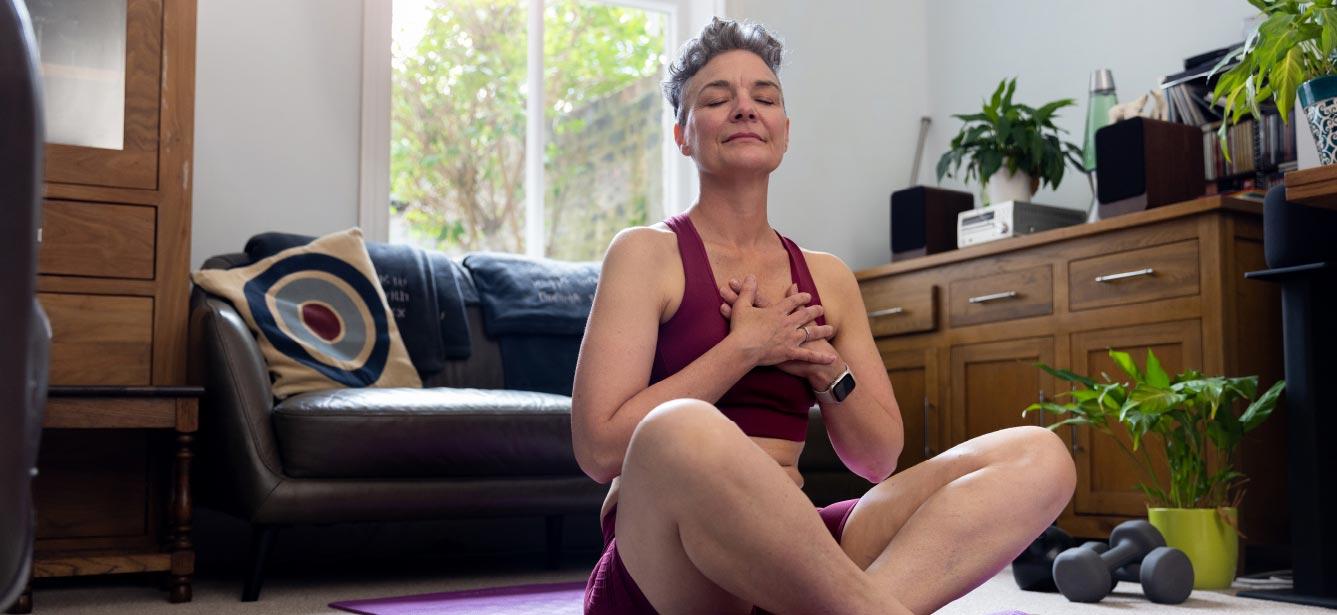
Related Topics
The late writer and activist Betty Friedan once said, “Aging is not lost youth, but a new stage of opportunity and strength."
And while that’s true, growing older can also usher in a new stage of sleep issues—especially for women in or approaching menopause.
Disturbances in sleep tend to arise during perimenopause—the phase leading up to menopause—which can start in our early to mid-40s. In fact, more than 40% of perimenopausal women report sleep problems.1 Sleep disorders can persist after menopause as well. One study of postmenopausal women found that 52% to 64% struggled to get a good night’s rest.2
Can you relate? If so, take heart: While sleep problems are common in the menopause years, they’re not something you “just have to deal with.” Let’s take a look at why sleep changes during this phase of life, the most frequent sleep issues in menopause, and what you can do to secure better slumber.
What is menopause?
Menopause is a natural biological transition marking the end of a woman’s reproductive years. During this time, major hormonal changes take place—primarily a decrease in estrogen and progesterone levels. In the U.S., menopause usually happens between ages 45 and 55, with the average onset around age 52. A diagnosis of menopause is typically made once 12 consecutive months have passed without a menstrual period.
Why sleep is often affected during menopause
When your hormone levels fluctuate during the menopause transition, your sleep cycles can be thrown into a tailspin. This is because:
- Estrogen affects the body’s ability to regulate temperature. As levels drop, it can lead to discomfort and drenching night sweats. Estrogen also supports serotonin production, which influences mood and sleep.
- Progesterone has natural sedative effects, so its decline may make it harder to fall or stay asleep.
- Cortisol, the stress hormone, may also be elevated during menopause, further interfering with sleep. High cortisol levels have been linked to insomnia, nighttime waking, and less sleep time overall.
Dropping estrogen levels can trigger emotional changes during menopause as well. You may find yourself feeling more anxiety, irritability, and sadness. Your mood may swing wildly back and forth. This emotional turbulence can make it more difficult to wind down at night and stay soundly asleep.
What kinds of sleep problems can menopause cause?
Menopause can affect your sleep and wellness in a number of ways, both directly and indirectly. We explore some common sleep issues below.
Insomnia and difficulty staying asleep
One of the most common complaints during menopause is insomnia, which is defined as having trouble falling asleep or waking up frequently during the night. You may find yourself lying awake for hours—or waking up at 2 a.m. and staring at the ceiling. Over time, these restless nights can lead to daytime fatigue, moodiness, and even depression.
Lower sleep quality
Studies show that due to hormonal shifts that affect natural sleep rhythms, menopause is often characterized by fragmented, lighter sleep. A lack of deep, restorative rest can leave you feeling sluggish the next day. It also tends to create a frustrating feedback loop where anxiety about not sleeping only makes it harder to sleep.
Hot flashes and night sweats
If you’ve ever had a hot flash, you know all about the sudden, intense flare-ups of heat that creep across your face, neck, and chest. These vasomotor symptoms are a hallmark of menopause and are directly linked to hormonal changes. When hot flashes occur at night, they can lead to night sweats—profuse sweating that causes perspiration to soak your bedsheets. More than 80% of women experience hot flashes during the menopause years.3
Hot flashes are more than a momentary discomfort. “If hot flashes happen throughout the night, they wake you up and disrupt your sleep. As a result, you’re tired all the time, and it can greatly impact your quality of life,” said Hugh Taylor, MD, chair of Yale Medicine Obstetrics, Gynecology & Reproductive Sciences, in an interview with Yale Medicine.
Sleep apnea
The hormonal changes that accompany perimenopause and menopause can increase your risk of developing obstructive sleep apnea. This is a disorder where a blockage or narrowing of the airway disrupts breathing and causes nighttime wakings.
“The scientific theory behind this is that estrogen and progesterone are protective, and as they decrease throughout menopause, a woman’s upper airway becomes more collapsible, leading to the development of obstructive sleep apnea," Yonatan Greenstein, MD, FCCP, an associate professor of medicine at Rutgers New Jersey Medical School, told Verywell.
How can I improve my sleep during menopause?
There is no silver bullet to cure menopause sleep issues. And what works for one person may not work for another. But the well-tested sleep strategies below may be worth exploring.
Hormone-based and non-hormonal medical treatments
For some women, hormone replacement therapy (HRT) can relieve sleep disturbances, hot flashes, night sweats, and mood swings by supplementing estrogen and progesterone. HRT can be delivered systemically through pills, skin patches, and gels. It can also be delivered locally in the form of a vaginal cream, tablet, or ring.
While HRT can ease sleep disturbances in menopause, it can pose risks for some patients (e.g., blood clots, stroke, certain cancers). Talk to a health care provider about your medical history before starting any hormone replacement regimen.
Non-hormonal medications, including some antidepressants, have also been found to reduce hot flashes and improve sleep quality.
Natural and lifestyle interventions
“Making dietary and lifestyle changes is a viable option for women at the time of their menopause,” said menopause expert Maryon Stewart. Some natural strategies to address sleep disturbances in menopause include:
- Good sleep hygiene: This includes keeping a consistent sleep schedule and stopping screen time at least an hour before bed. Maintaining a cool, quiet, and dark bedroom can also set the stage for sound slumber.
- Dietary changes: Caffeine, alcohol, spicy foods, and processed foods—especially in the evening—can all impact your ability to get quality sleep. Aim to keep these things to a minimum.
- Physical activity: Regular exercise improves sleep, but try to work out earlier in the day. Evening workouts can keep you alert too long.
- Stress management: Tools such as meditation, yoga, deep breathing, and progressive muscle relaxation can help calm your mind and body before it’s time to hit the sheets.
Supplements and herbal remedies
Some women find menopause symptom relief with natural remedies. Supplements to consider include:
- Melatonin: Supports your natural sleep rhythms
- Valerian root and chamomile: Used for relaxation and mild insomnia
- Black cohosh: May reduce hot flashes, though research is mixed
Keep in mind that natural doesn’t necessarily mean safe. Reach out to your health care provider before starting any supplement, especially if you take other medications or have chronic conditions.
Cognitive behavioral therapy for insomnia (CBT-I)
CBT-I is a highly proven, non-drug treatment for chronic insomnia. It works by helping you change deeply ingrained negative thoughts and behaviors around sleep. Techniques used may include sleep restriction (limiting the time spent in bed), stimulus control (like getting out of bed if you can’t sleep), and relaxation training.
Don’t suffer sleeplessness in silence
If your sleep problems persist for more than a few months and they’re affecting your waking hours, it’s time to contact your doctor. Getting the right diagnosis is key to finding effective treatment. Your provider can assess your symptoms and rule out specific medical causes of your sleeplessness, such as thyroid issues. They may also recommend a sleep study or additional testing.
Menopause and sleep issues can go hand in hand, but there are many ways to improve your rest and reclaim your energy and vitality. With small adjustments and a bit of patience, you’ll be well on your way to sweet dreams.
Menopause and sleep FAQ
When do menopause-related sleep problems typically start?
Sleep problems often first appear during perimenopause—the transitional phase before menopause—which typically begins in a woman’s early to mid-40s. As hormone levels continue to fluctuate, these symptoms can worsen.
Can hormone therapy help me sleep better?
It may. For many women, HRT improves sleep by reducing hot flashes and mood swings. But it’s important to discuss this treatment with your health care provider first to weigh the risks and benefits.
Are natural remedies like black cohosh effective for night sweats?
Some studies show black cohosh may help with hot flashes and night sweats, but results are mixed. It’s best used natural sleep remedies only under the guidance of your doctor, especially if you have liver or hormonal conditions.
Sources
1. Kyung Mee Park, MD, PhD. Sleep Disturbance in Perimenopausal Women. Chronobiology in Medicine 2024. September 30, 2024. Found on the internet at https://chronobiologyinmedicine.org/journal/view.php?doi=10.33069/cim.2024.0027
2. Nader Salari, et al. Global prevalence of sleep disorders during menopause: a meta-analysis. Sleep and Breathing. March 9, 2023. Found on the internet at https://pmc.ncbi.nlm.nih.gov/articles/PMC9996569/
3. Ramandeep Bansal, et al. Menopausal Hot Flashes: A Concise Review. Journal of Midlife Health. Jan-March 2019. Found on the internet at https://pmc.ncbi.nlm.nih.gov/articles/PMC6459071/



